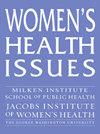从阿片类药物使用障碍中恢复的妇女性健康和生殖健康的经验和观点。
IF 2.5
2区 医学
Q2 PUBLIC, ENVIRONMENTAL & OCCUPATIONAL HEALTH
引用次数: 0
摘要
背景:与没有阿片类药物使用障碍的妇女相比,从阿片类药物使用障碍(OUD)中恢复的妇女的性健康和生殖健康(SRH)需求未得到满足,导致意外怀孕和性传播感染/艾滋病毒感染等健康差异。本定性描述性研究的目的是探讨多重社会生态影响(个人、人际、社区、社会)共同发生对OUD康复妇女SRH的感知和体验。方法:采用目的抽样方法,招募年龄在18-49岁、自我认同为OUD恢复期、会说英语的顺性女性。我们对每个参与者进行了一次45到60分钟的录音半结构化电话采访。结果:本组22例患者中,59%为白种人,平均年龄34.7岁(SD = 6.8)。我们在社会生态层面确定了与SRH相关的主题。性健康和生殖健康的整体定义:参与者描述了他们在康复期间与性健康和生殖健康相关的知识和行为的演变,包括预防健康、情绪健康和健康的关系。关系的重新评估:参与者描述了对他们的关系进行的批判性评估,并确定了加强或威胁他们恢复的关系。建立和生活的社区:参与者描述了社区的社会和物理领域的重建和重组。污名化的阴影:参与者描述了与生育能力、性生殖健康和康复相关的污名化行为。结论:恢复期女性对性健康生殖健康的广泛描述超出了获得避孕和性传播感染/艾滋病毒筛查的范围。以性健康和生殖健康为重点的干预措施必须考虑到对妇女产后康复健康的复杂多层次影响。本文章由计算机程序翻译,如有差异,请以英文原文为准。
Experiences and Perspectives of Sexual and Reproductive Health Among Women in Recovery From Opioid Use Disorder
Background
Women in recovery from opioid use disorder (OUD) have unmet sexual and reproductive health (SRH) needs resulting in health disparities such as unintended pregnancy and sexually transmitted infections/HIV infection compared with women without OUD. The purpose of this qualitative descriptive study was to explore the perceptions and experiences of co-occurring multiple social-ecologic influences (individual, interpersonal, community, society) on SRH among women in recovery from OUD.
Methods
Purposive sampling was used to recruit cis-gender women aged 18–49 who self-identify as being in recovery from OUD and speak English. We conducted one 45- to 60-minute audio-recorded semistructured telephone interview with each participant.
Results
In our sample (N = 22), 59% identified as white and the mean age was 34.7 years (SD = 6.8). We identified themes related to SRH across social-ecological levels. Holistic Definition of SRH: Participants described an evolution of their knowledge and behaviors related to SRH during recovery to include preventive health, emotional well-being, and healthy relationships. Reevaluation of Relationships: Participants described undergoing a critical appraisal of their relationships and identified relationships that strengthened or threatened their recovery. Built and Lived Community: Participants described a rebuilding and restructuring of both social and physical domains of community. Shadow of Stigma: Participants described experiencing stigmatizing behaviors related to the interconnectedness of their childbearing capacity, SRH, and recovery.
Conclusions
Women's expansive descriptions of SRH in recovery extend beyond access to contraception and sexually transmitted infection/HIV screening. Interventions focused on SRH must account for the complex multilevel influences on the health of women in recovery from OUD.
求助全文
通过发布文献求助,成功后即可免费获取论文全文。
去求助
来源期刊

Womens Health Issues
Multiple-
CiteScore
4.50
自引率
6.20%
发文量
97
审稿时长
32 days
期刊介绍:
Women"s Health Issues (WHI) is a peer-reviewed, bimonthly, multidisciplinary journal that publishes research and review manuscripts related to women"s health care and policy. As the official journal of the Jacobs Institute of Women"s Health, it is dedicated to improving the health and health care of all women throughout the lifespan and in diverse communities. The journal seeks to inform health services researchers, health care and public health professionals, social scientists, policymakers, and others concerned with women"s health.
 求助内容:
求助内容: 应助结果提醒方式:
应助结果提醒方式:


